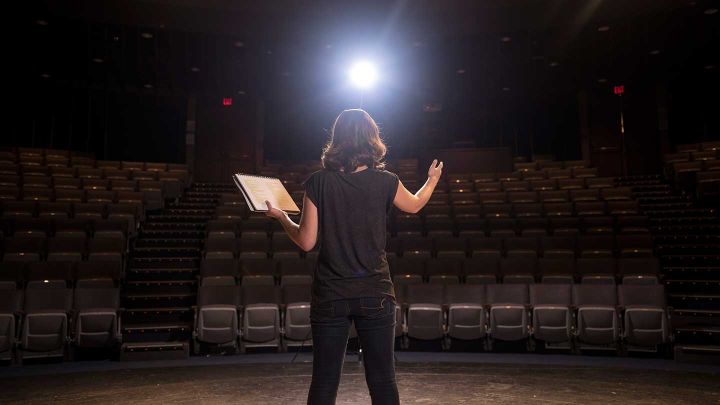The Welcome Wagon by Greg Veltman
If you’ve heard anything by Sufjan Stevens, then this music from his childhood friend, Vito Aiuto and his wife Monique, will not surprise you. Using the tones and textures that Stevens has perfected, The Welcome Wagon takes on a more bluegrass and Americana sound. As a Presbyterian pastor, the music and lyrics attempt to make an escape from what is labeled “Contemporary Christian Music.”
The Welcome Wagon’s first album, “Welcome to the Welcome Wagon,” was produced by Sufjan Stevens, and was released at the end of 2008. Their 2012 release, “Precious Remedies Against Satan’s Devices,” is a collection of original songs (and a few covers, including David Crowder’s “Remedy”), taking up more obscure and difficult parts of the Bible and Christianity and singing them with an indie-folk/Americana sound.
Take the first track, “I’m Not Fine,”
“I’m not fine
And you’re not fine
And we’re not fine together (dear)
I told you I was sorry
Are you sure that it’s enough?”
The Christian community can often fall into this “fine” theology. That we are fine as we are, not broken people in need of a savior, and not a band-aid Jesus either.
On “My God, My God, Parts 1 & 2,” they set the last words of Christ to gentle sorrowful music. While The Welcome Wagon sing toward hope, they don’t arrive there without a good hard look at the pain and suffering in the world, and the lamentable human condition that the fall has brought about.
The Welcome Wagon will perform in the CFAC auditorium on Thursday, April 11. Andrew Rose Gregory will open the show at 8pm. They will also lead worship in chapel on Friday, April 12.
Andrew Bird by Michael Bass (SAO Intern)
This past summer I found myself on a 2,000-mile road trip with a middle-aged woman whom I did not know well. Of course road trips mean listening to music, and lots of it, so, what to choose? She played her Irish jigs, and I was disinterested in the spellbinding repetition. She had never heard of Radiohead, and couldn’t sit comfortably after two songs. I thought we hit a point of no agreement until I spotted Andrew Bird on my iPod. I pressed play on 2001’s “The Swimming Hour,” and peace was made. She was interested in his traditional violin technique, while I was moved by his flowing arrangements. We steadily listened through each of his records and soon we were both singing along. Bird possesses the rare ability to comfortably reflect a world of traditions in a four-minute pop song.
Fresh out of college, Bird began his recording career with “Music of Hair”, showcasing his violin skills and his fascination with American and European folk traditions, as well as jazz and blues. After forming the band “Andrew Bird’s Bowl of Fire”, Bird released three consecutive albums that were seemingly written by an early-twentieth century globetrotter. The songs aren’t just influenced by the sounds of folk, pre-war jazz, gospel, Latin, zydeco and rock. They seem to be straight adaptations of traditional tunes. This was an emotional rebellion from Bird’s academic training that stressed the intellectual side of music making. Bird embraced improvisation, contradicting the values of his classical music education.
With concert audiences capping at 40, Bird took his first solo gig. Reluctant to perform alone, Bird experimented with a looping station, whistled on stage for the first time, and after a great response he realized that there was a new future for his career. Recording and performing solo, Bird indulged simplicity. With his next three records, Bird focused his songwriting and arrangements on an indie-folk sound and embraced studio production. In turn, “Armchair Apocrypha” managed to reach 76 on the Billboard 200 and was accompanied by rave reviews. 2009’s “Noble Beast” maintained Bird’s audience while displaying his influences more literally than the previous successes. 2012’s “Break it Yourself” and “Hands of Glory” take that idea even further, returning to the Latin and bluegrass sounds of Bird’s early work.
Bird’s manager, Andrea Troolin, writes, “In his first couple of albums, you can hear a lot of his influences. I think it was a matter of him getting that out of his system in some ways and figuring out what an Andrew Bird song sounds like.” As much as Bird’s early career was based on replication, he has recently managed to formulate a distinct sound. Bird has found a way of sneaking anything from the sounds of 1930’s jazz to southern gospel into what may sound like a hip indie-rock track. Look at “Danse Carribe” from 2012’s “Break it Yourself”. The song introduces a swung folk verse, moves to a contextually obscure Caribbean-style breakdown with complicated rhythms, and then begins a double-stop violin solo, a sound reminiscent of bluegrass. Bird has found a way to intertwine numerous cultural references … only to produce something that sounds entirely unique. Listening to Bird’s most recent work is an adventure of sorts.
While some artists’ lyrics are directly confessional, and others’ claim no reason behind the text, Bird finds a middle-ground between the two approaches. Bird doesn’t deny the personal depth of his lyrics, but has explained that he looks to keep the meanings of his songs private. He designs the lyrics intentionally, in part to protect his privacy and also for own sanity, considering the rate at which he performs. Mixing meaning into obscure and veiled lyrics, Bird manages to “forget” the original intent of the text, identifying new meaning in the lyrics, as if he did not possess the mind and heart that composed them. While this perspective makes the artist appear especially private, it is interesting that Bird admits that there actually is reason and personal thought behind his text. This compares with the many artists who deny that any statements are made through their art.
Bird’s text reminds us that words and music can have meaning without being limited to only one meaning. It is in this space that reflection can flourish and questions can be nourished.
Andrew Bird will perform as part of the Festival of Faith and Music on Friday, April 12.
Josh Garrels by Jacqueline Ristola
Josh Garrels isn’t a new face to Calvin, or unpopular either. At last year’s Festival of Faith and Writing, popular demand moved the Josh Garrels show from the Recital Hall to the main auditorium. Closing his set with hip-hop-folk fusion “The Resistance,” he remarked whether the song deserved to be played in such a grand room. Mostly assuredly, the song, and his work as a whole, is well worth the enthusiasm.
Garrels has grown from the relatively unknown folk artist whose has quietly put out six albums in the last ten years. His most recent full release, “Love & War & the Sea In-Between,” garnered considerably more press, with “Christianity Today” naming it the best album of 2011. And in true indie spirit, Garrels gave his album away from free for a full year, with its successor, “Love & War: B Sides & Remixes,” now free as well. Both albums illustrate everything unique about Garrels as an artist, distinguishing himself with the ability to work in different music styles and poetic lyricism. Much like Gungor, Josh Garrels is raising the bar for music with strong Christian themes.
Garrels appropriates various musical styles effectively in his work, making “Love & War” a diverse listening experience. Besides his folk roots, Garrels ventures in various musical styles from rap on “The Resistance,” to eastern European sounding strings on “Sailor’s Waltz.” It not only adds flavor to the album, but uses the music to reflect various subjects of the songs. Garrels uses the direct and socially conscious nature of rap to address broken systems:
“I was born into a system constructed for failure
It’s a sinking ship manned by drunken sailors . . .
My rest is a weapon against the oppression
Of man’s obsession to control things
Look at the long line of make believe kings
The lord of the flies wants you to kiss his ring
Follow new rules with invisible strings
And become a puppet in the diabolical scheme
How do good men become part of the regime
They don’t believe in resistance.”
Garrels explores styles while using them to effectively illustrate his ideas, a process that ultimately uniquely marks his music as his own.
But Garrels is also a poet, with a keen sense of rhyme and metaphor. Tracks such as “The Resistance” and “Farther Along” illustrates not only eloquence in his prose (three years in theological training likely helps), but some remarkable internal rhyme as well, songwriting you rarely see in contemporary music. “Love & War” also has traceable, overlying metaphors of the flame, the anchor and the sea representing God’s presence, his strength, and the chaotic world around us, respectively. Leaning away from the current trend of albums becoming merely a collection of singles, the album is instead cohesive, a meditation on seeking the divine amidst the chaos and brokenness of our world. It’s these poetical traits that perhaps best distinguishes Garrels from other artists by examining the world through a Christian lens for in ways seldom seen in most popular music.
Working with such rich material, Mason Jar Music has plenty to work with. A collective of audio-visual artists working to present organic performances in unique settings and spaces, they’ve recently made remixes and new arrangements of his songs of his latest songs. Their most prominent collaboration has been “The Sea In Between,” a film of live performances of Garrels and Mason Jar on the beautiful outdoors of Mayne Island, British Columbia. With highly skilled musicians, Mason Jar remixed and rearranged Garrels’ songs “Processional” and “White Owl,” adding new layers of texture and movement to each piece. With both Garrels and Mason Jar Music, there is a high attention given to craft, making each artist quite worthy to highlight during FFM.
Josh Garrels and Mason Jar Music will be performing in the CFAC on Sat., April 13. Kenyon Adams will open the show at 8pm.






